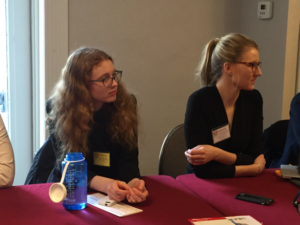My stomach began to churn as I walked toward my committee room. Leaving sweaty fingerprints on the thin yellow pages of my legal pad, I gripped it tight against my chest as I slid into my seat. I was early; only two other people had arrived. The nerves that preceded each conference I attended had already begun to set in. Two minutes after I settled into committee, and I looked around the room to notice one other woman sitting in the room of 13 people. We smiled, and fist-bumped each other. “We’re the only two girls here,” she said to me. I smiled too. I noticed these things often, each time I stepped into a new committee room.

Credit: HNMUN 2017
Female representation in crisis committees is especially low within the Model UN community. Amongst those who do participate in crises, self-identifying women seem to succeed, both in award placement and in inserting themselves into dialogue, at a lower rate than those identifying as men. Often, it is not malicious intent of chairs or other male-identifying delegates, but perceptions that affect delegate interaction within committee. There are little to no definitive data collected on the demographics of most Model UN conferences, or the makeup of different types of committees. Truly, chairs and secretariats usually do not try to take surveys, or make head counts of each committee to measure demographics and success rates. Therefore, the points I have made are more based on personal observation and hypothesis than on synthesis of pure numbers, and are strong trends I’ve noticed.
This lack of representation could be due to many underlying reasons. First, some teams may operate with pre-conceived notions that women are more fit to be General Assembly delegates than to be crisis delegates. People do not need to be told to their face to feel this way; head delegates of schools who assign positions could place women in GAs at a higher rate than men, female delegates can hear jokes about GA delegates through word of mouth, or femmes could even try crisis committees just to notice the imbalance and not want to return.
Additionally, crisis committees are styled to be more individually focused than consensus-focused. Directives can often pass with just one sponsor, and personal crisis notes push committee forward. Backstabbing and ousting can be encouraged, as opposed to working together. Women who assert themselves confidently and dominantly into groups are often identified as “bossy” or too loud. Within a crisis committee, people must balance collaboration with self-interest, yet with this negative view of strong female delegates, “boys’ clubs” can easily be formed to push out the competition.

Credit: BruinMUN 2017
Often, crisis committees are war or fantasy-style cabinets. While these such topics should not be gendered, perceptions of war as “areas of male expertise” can play into allocation and sex/gender distribution within crises. Of course, this links to societal biases and gender norms that exist in our societies, and are reflected in real governments that Model United Nations committees simulate. Especially within historical crisis committees, character representatives are very rarely self-identifying women. In current cabinets, women are still sorely underrepresented as heads of state or ministries.
This year, I chaired a high school crisis committee for the first time. At the end of the conference, I offered feedback for anyone who wanted to come up to talk to me. A delegate came up to me, and I was happy to give her constructive feedback. At the end, a question she asked stuck with me: “I love crisis,” she began, “but I feel like I can never get a word in during unmoderated caucus with all the tall guys forming circles. How can I stand out?”
Her question broke my heart, not just because she experienced this helplessness, but because I did not have a good answer for her. In this world of crisis, a lot of female delegates might be trying to hunt for the answer to that very question. Yet, the only thing we can do as of now is to encourage participation, raise awareness, and continue fighting for a seat at a male-dominated table. One day, maybe we’ll even have a response for her question.

Sources: UN Women, HNMUN 2017 Press

